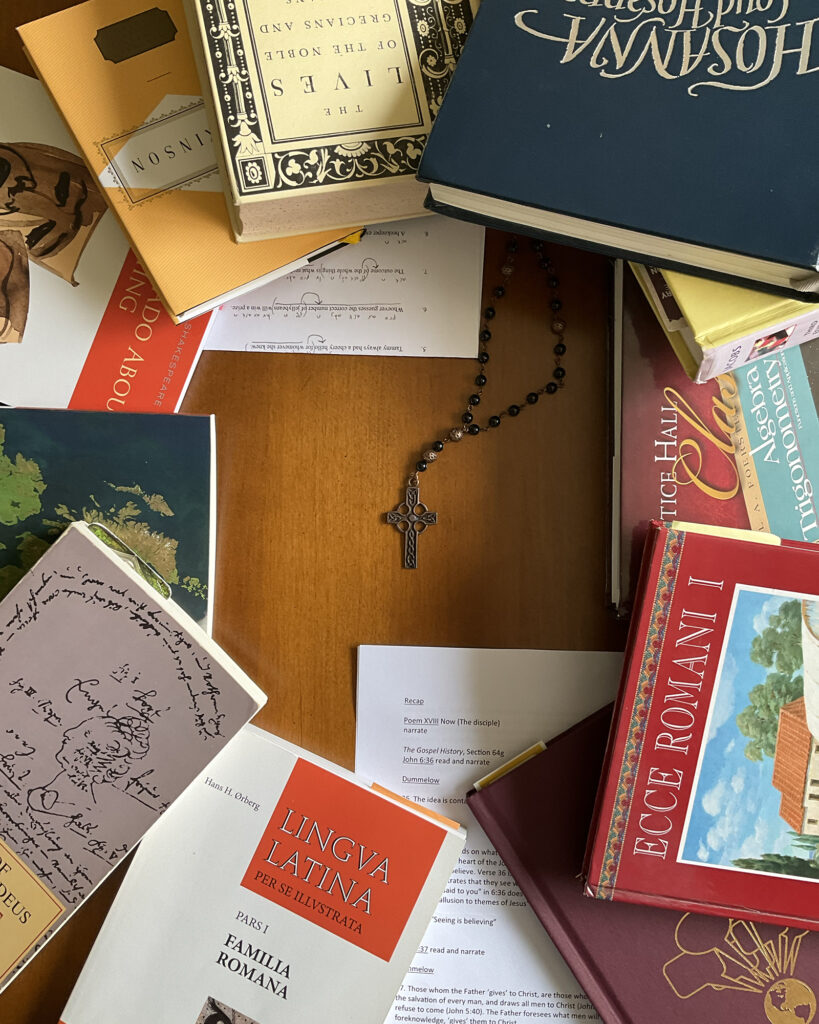The CMP Review — Week of June 19
June 19, 2023

“There can be no greater vocation in life than the family responsibility of sharing life with the growing child. The school is an extension of our home. These are hard days, in many ways, for rightful living. It doesn’t ‘just happen.’ Stop and think. Get priorities right. And remember, education is ongoing. We, too, are learning, growing, living. We are to ‘become as little children.’” (Susan Schaeffer Macaulay, For the Children’s Sake, p. 157)
@tessakeath
June 20, 2023

In 1904, Charlotte Mason wrote that “The Parents’ Union exists to advance, with more or less method and with more or less steadfastness, a definite school of educational thought of which the two main principles are—the recognition of the physical basis of habit, i.e., of the material side of education; and of the inspiring and formative power of ideas, i.e., of the immaterial, or spiritual, side of education.”
This two-pronged focus, emphasizing both ideas and habits, has been tricky to maintain in the 100 years since Mason wrote those words. But in 1936, at a gathering of hundreds of Parents’ Union members in Ambleside, two leaders spoke in tandem about these two disparate ideas and how they apply to character training. Mary Hardcastle spoke on ideas and Claudia Shelley spoke on habit.
Today as we read Charlotte Mason’s six volumes we sometimes puzzle over Mason’s intricate and subtle thought. What does she mean by the “Way of the Will”? How about “the habit of perfect execution”? Help is available to us in the form of these two rare and insightful papers from 1936, written by graduates of Mason’s own House of Education.
But more than interpreting Mason’s thought for us, the papers also inspire us in new directions that build on Mason’s foundation. What would concepts like “the sacrament of the moment” and the habit of a “daily quiet time” mean to people who knew Miss Mason herself? With Katherine Dlugolonski as the voice of Mary Hardcastle and Jennifer Talsma as the voice of Claudia Shelley, now you can find out. Listen to or read these two timeless papers brought to life for the first time in almost one hundred years. You can find them together here.
📷: @aolander
@artmiddlekauff
June 21, 2023
The Rosemary Tree is the only reread in the stack, but Elizabeth Goudge books are like comfort food to me.
Any thoughts on what I should read next?
@rbaburina
June 22, 2023

The homeschool parent lives a paradox. Few of us grew up thinking we would be teachers, but now we teach every day. Few of us spent time in school learning to teach, but now we take every spare moment to learn. Most of us had ambitions and dreams in the big world, but now we dwell on a little home’s dreams. We seem to lack many qualifications, but we have the most important one of all. It is reassuring for us to hear the words of Stephen Wise, spoken in New York in 1910: “The needs of the teacher are only two, but they mean so much—preparation and consecration.”
“Preparation is the never ceasing process of fitting oneself from day to day for the ever increasingly difficult task of teaching. Consecration is a sense of devotedness to the teacher’s calling arising from a realization of the sacredness of the teacher’s responsibility. Consecration may be reduced to simpler terms—love! Love for the child, love for the task! And love in its turn implies so much—respect, sympathy, forbearance. Love for the child!”
I spend time in preparation every day. Laying out lessons, choosing books, storing knowledge in myself. But that is only one of my needs as a teacher. The other is consecration.
In 1914 E. A. Phillips wrote, “‘For their sakes,’ for the children’s, ‘I consecrate myself daily.’” I may not have all the training. I may not have all the knowledge. I may not have all the answers. I may not have all the skills. But I have consecrated myself to the Supreme Educator. It is His work. And I know that He will get it done.
@artmiddlekauff
June 23, 2023
One of my little neighbour friends called me over to hear this toad squeaking.
I did not know that male toads squeak.
Turn your volume up to hear the sweet and funny sound!
Charlotte Mason was spot on in calling the world of living creatures a “field of unbounded interest and delight”. (Vol I, p 56)
@antonella.f.greco
June 24, 2023

My youngest and I hiked Holston River Mountain and then climbed the 60-ft fire tower (built in 1937) for a birds eye view of Kingsport and the surrounding mountains.
Neither of us are adrenaline junkies and, not gonna lie, it was really windy and scary. We’ve been in a season of hard things and this was a tangible reminder that God can appear in smoke and fire; or in a still, small voice.
Back on the ground, we read about the life of fire tower keeper Govan Smith in 1953. In the crow’s nest he kept on the lookout for smoke, relayed weather conditions, kept track of the moisture content of basswood sticks, and composed poetry.
@rbaburina
June 25, 2023

Charlotte Mason’s twelfth principle introduces a phrase famously associated with her method: “Education is the Science of Relations.” The principle asserts that the child is born with aptitudes and abilities that equip him for self-education. In the 1923 book In Memoriam, Ellen Parish attempted to explain the source of this and other key elements of the Charlotte Mason method. She pointed to a common source for them all: the Holy Gospels.
For Principle 12, Parish pointed to Mason’s poem “What is truth?” This poem is included in Volume 5 just after Mason explores Christ’s words about truth in John 8:45–47. However, the title of the poem clearly evokes John 18:38, when Pontius Pilate asks “What is truth?” Mason’s poem points directly to that moment, opening with the line, “Nay, what is truth? the cynic lightly cried; But not to him the Incarnate Truth replied.”
From this starting point, Mason proceeds to an inquiry about truth, and she points out that light, music, harmony, and truth all presuppose persons with senses to apprehend such things. The poem closes with these lines: “As though that simple man would say, ‘The light Is its own evidence for men with sight!’”
Mason’s twelfth principle asserts the presence of “first-born affinities [t]hat fit our new existence to existing things.” As teachers, we assume our children are born with sight. Read or listen to the poem that, according to Ellen Parish, lies behind this inspiring thought. Find it here.
@artmiddlekauff